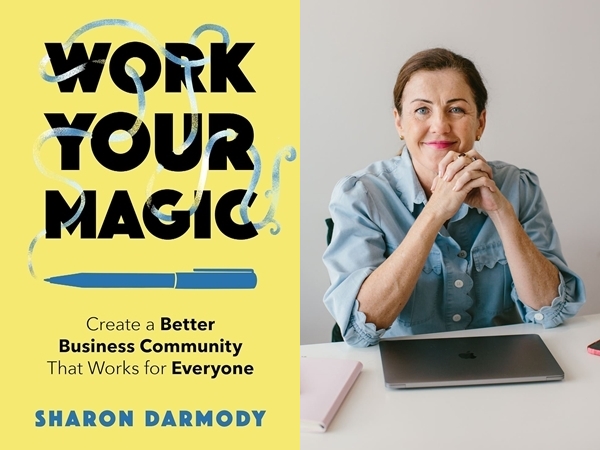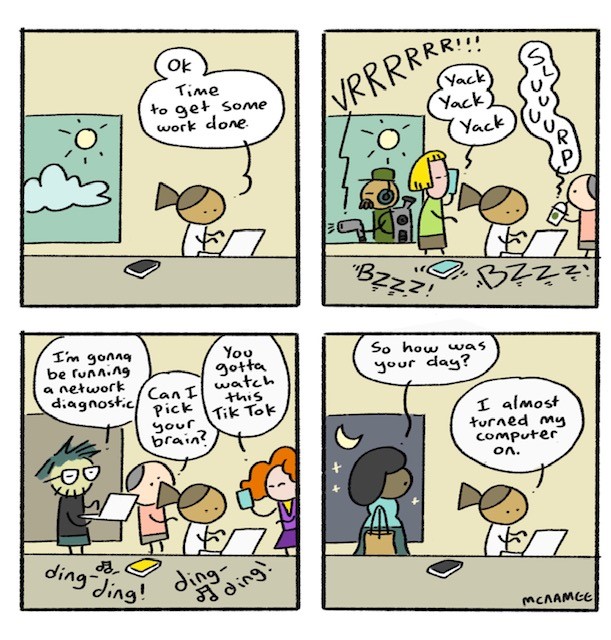Salary demands are higher than ever (as we covered last week), but that’s not the only rising cost of labor. Annual health insurance premiums for employees averaged $24,000 in 2023, a year-over-year jump of 7%, according to a new report from KFF.
“We have a huge premium increase this year,” study co-author Matthew Rae told CNN, adding, “There are lots of affordability challenges for employer coverage.”
Employers paid for approximately three-quarters of premium amounts. Almost 1 in 4 companies are planning to cut back on that assistance, which might save money but hurt recruiting and retention. “Employers want to keep offering good benefits to keep good people,” Rae explained.
|
|
|
Coworker Arguments Will Happen, So Set Ground Rules
|
(Source: She Writes Press)
|
The following is an excerpt from Work Your Magic: Create a Better Business Community That Works for Everyone by Sharon Darmody.
In my experience, more often than not, an organization’s approach to conflict is to dig a very big hole and to put their head in it. But this only worsens the situation, for both the individual parties involved and those who work alongside them, and if you’re committed to a workplace that puts psychological safety front and center, this is something you need to address.
To begin to rethink attitudes toward conflict in your workplace, you might let people know that it’s natural for us not to get along all the time — especially in an environment where people are encouraged to have their own opinions, as sometimes these are bound to rub against one another. This means having some ground rules in place to ensure that we explore options and consider different points of view and that we do this with people’s psychological safety front of mind.
Examples of ground rules to address the above two points might be:
- We don’t allow things to fester. When we can see there is a problem, we lean in to any discomfort and make sure people come together to discuss it, as opposed to the head-in-the-sand approach favored by many workplaces.
- We have people in our workplace who have specialist skills in negotiation or facilitation, and we have external resources that we can call on if required. The most important thing is that this is discussed honestly and plainly and seen as just part of business and not some dirty secret.
Another great ground rule: “We speak to people, not about them.” A mentor of mine, Di McDonald, called this ground rule Penny/Jane/Bill. If Penny has a problem with Bill, the person she needs to speak to is Bill.
What often happens instead, however, is that, fearing conflict, Penny will speak to Jane instead of raising her issue directly with Bill. But when Penny speaks to Jane, nothing changes. All she has really done is spread “bad feeling” about Bill, creating toxicity along the way, something I see playing out in workplaces every day.
By introducing the Penny/Jane/Bill “rule” at induction, as we did in our organization, not only are you encouraging clear communication between individuals, but you are also giving people permission to speak up when approached with a gripe about somebody else. You can simply say, “Sorry, Penny/Jane/Bill,” which is code for “We don’t gossip here; it’s not helpful.”
This is a great practice among colleagues, but it will also work for a manager who finds herself listening to a team member who wants to unload about a colleague without actually doing anything to challenge their behavior. Without a doubt, it takes courage to speak to people face-to-face. But once it’s established as a collective practice, it makes it less about “conflict” and more about simply keeping us all on the same page and getting the job done.
When people have clarity in these areas, they won’t be wasting time worrying about mixed signals, trying to decipher what someone might have meant, or trying to second-guess how a situation will play out. This frees up time and energy to be applied to the work at hand, along with the brainpower needed for creativity and innovation. It’s estimated that 50% of a manager’s time is spent managing conflict; can you imagine if you had all that time to apply to creative problem-solving instead?
Excerpted from Work Your Magic: Create a Better Business Community That Works for Everyone by Sharon Darmody © 2023 by Sharon Darmody, used with permission from She Writes Press.
|
|
|
Supporting Bereaved Employees: Remember CARE
|
Dr. Ben Baran is an associate professor at Cleveland State University and co-founder of Elevating What Works.
Almost every person will experience death-related grief at some point, and this certainly includes your employees. Unresolved grief costs organizations billions, yet research is starting to show how managers can best handle grief in the workplace through how they treat bereaved employees.
The CARE model, which stands for Communication, Accomodation, Recognition, and Emotional support, provides such guidance. It’s based on interviews with people who’ve returned to work following the death of a close relative and suggests a set of best practices as follows:
- Communication: Initiate or maintain two-way communication with an employee who has experienced the death of a loved one. Provide information about bereavement policies and any additional available support resources, such as an employee assistance program (EAP). Proactively suggest ways to help take burdens off the employee.
- Accommodation: The average bereavement leave in the United States is 3 to 5 days, but grief can affect employees for years. Consider how you might temporarily redesign the bereaved employee’s job or offer a flexible schedule. Coworkers might be able to help by sharing workloads.
- Recognition: Bereaved employees often appreciate even small gestures that acknowledge their loss. While these gestures can come from anyone, simple recognition from senior leaders can be extraordinarily supportive. Continuing on like nothing happened can actually be hurtful to bereaved employees because they may interpret it as a lack of caring.
- Emotional support: Demonstrating that you know the employee is going through a difficult time, along with warmth and kindness in your tone, is important. Ongoing individual displays of support through simple kind words as well as collective displays of support from the organization or department can go a long way in helping the bereaved employee cope.
While such support may increase the loyalty of that employee to their work organization, when managers remember CARE, they are most importantly helping a suffering person.
Learn the ins and outs of bereavement leave and why you should offer it to grieving employees.
|
|
|
In an era when A-list celebrities are raking in extra millions by signing partnerships with tequila and canned wine companies, the ongoing success and “let’s give it all away” mission statement of Newman’s Own remains inspiring.
Founded in 1982 by the late Academy Award winner Paul Newman, the brand now sells frozen pizza, tomato sauce, coffee, lemonade, dog food, and much more. But it started with a salad dressing recipe that was never intended for the supermarket.
Just for fun, Newman and author A. E. Hotchner would stir up batches of their homemade salad dressing to share with friends, who kept insisting they could actually sell it. Convinced, the duo raised $20,000 as seed money and went to market.
Their first year in business, Newman’s Own made a staggering $300,000 in profits, which Newman and Hotchner gave away to charity. Since then, the company has donated $600 million through the Newman’s Own Foundation — and, yes, the salad dressing recipe is still made with ingredients you can probably find in your kitchen.
|
|
|
On October 20 in Business History:
|
|
|
- 1947: The radio rights for three years of Major League Baseball’s World Series sold for $475,000. MLB’s annual broadcast rights are worth a reported $728 million today.
- 1960: The first mechanized post office opened in Providence, Rhode Island. It used an automatic, high-speed sorting facility to load, process, and transport mail.
- 1987: On the day following “Black Monday,” the Dow Jones saw a record-high 608 million shares traded.
- 2020: The U.S. Justice Department sued Google for its monopoly over search and search advertisement. The DOJ is now joined by 38 other states in the suit, which went to trial last month.
|
|
|
Written by Sharon Darmody and Ali Saleh. Comic by John McNamee.
|
|
|
|






